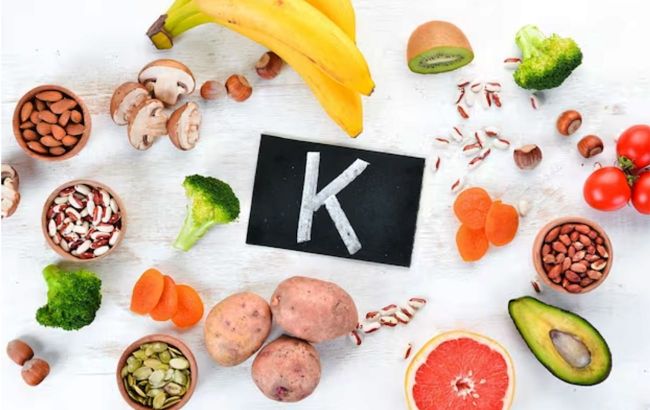Key role of potassium in human body and top food sources
 Why does a person need potassium and what should they eat? (Collage RBC-Ukraine)
Why does a person need potassium and what should they eat? (Collage RBC-Ukraine)
Potassium is a mineral that helps your cells function properly. It aids in generating the electricity that allows your cells to perform their tasks. Your nerves and muscles, including the heart, may not function properly if you don't get enough from your diet.
Find out why the human body needs potassium and in which foods it can be found, according to WebMD.
How much potassium do you need?
If you are aged 4 and older, you should aim for about 4700 milligrams of potassium per day. For breastfeeding mothers, it's recommended to get 5100 milligrams.
For newborns up to a year: 700 milligrams
Ages 1 to 3: 3000 milligrams
Ages 4 to 8: 3800 milligrams
Ages 9 to 13: 4500 milligrams
Why does the human body need potassium?
Helps with osteoporosis: Aging bones tend to become fragile. Consuming a lot of meat and dairy products can lead to the body producing too much acid, which can accelerate bone weakening. Potassium-rich foods, mainly fruits and vegetables, can slow down this process.
Prevents kidney stones: Potassium helps eliminate acid that retains minerals in the kidneys, preventing the formation of harmful stones.
Supports muscle function: Adequate potassium inside cells is necessary for muscles to function properly. An imbalance of sodium and potassium can weaken or force muscles to contract involuntarily.
Lowers high blood pressure: Potassium helps eliminate sodium, reducing tension in blood vessel walls and contributing to lower blood pressure.
Prevents strokes: Potassium can play a role in reducing the risk of strokes by helping control high blood pressure.
Where is potassium found?
Bananas: One medium banana contains 422 milligrams of potassium.
Potatoes: A medium baked potato with skin contains 926 milligrams of potassium.
Prunes: Half a cup of dried prunes contains 637 milligrams of potassium.
Oranges: An average orange provides about 237 milligrams of potassium, and a cup of orange juice contains around 372 milligrams.
Tomatoes: An average tomato contains about 292 milligrams of potassium.
Beans: Half a cup of beans contains 436 milligrams of potassium.
Supplements: It's preferable to obtain potassium from food, but you may need supplements if you suffer from certain conditions or take medications that make it challenging to maintain potassium. However, be cautious, as excessive intake can cause nausea, vomiting, abdominal pain, diarrhea, and ulcers. Consult your doctor to determine if potassium supplements are necessary.
Potassium problems:
Insufficient potassium (Hypokalemia)
If your body lacks potassium, your muscles may weaken, and you may frequently feel fatigued. You may also experience cramps or constipation.
Hypokalemia can result from not getting enough potassium from your diet, but more commonly, it occurs due to severe vomiting or diarrhea, excessive use of diuretics or laxatives, or alcohol abuse.
Excessive potassium (Hyperkalemia)
Infants, elderly individuals, and people with kidney diseases are more prone to this condition. You may not notice any symptoms, or your muscles may be weak, and you may experience irregular heartbeats or nausea.
You can develop hyperkalemia if you take certain medications or if your body doesn't produce a sufficient amount of certain hormones. Your doctor may treat this with medications or possibly dialysis - a process where a machine assists your kidneys in purifying the blood.
We also discussed whether it's possible to boost immunity with pills.
This material is for informational purposes only and should not be used for medical diagnosis or self-treatment. Our goal is to provide readers with accurate information about symptoms, causes, and methods of detecting diseases. RBС-Ukraine is not responsible for any diagnoses that readers may make based on materials from the resource. We do not recommend self-treatment and advise consulting a doctor in case of any health concerns.

